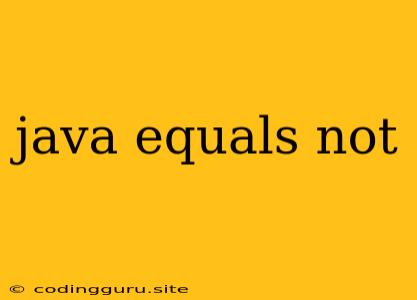Understanding the Nuances of the equals() Method in Java: Why Your Objects Might Not Be Equal
In the world of Java programming, the equals() method plays a crucial role in determining the equality of objects. It's a fundamental concept that often trips up beginners and even seasoned developers.
At its core, the equals() method answers a simple question: "Are these two objects the same?" However, the answer is not always as straightforward as it might seem. The default equals() implementation in Java inherited from the Object class simply compares object references. This means two objects are considered equal only if they point to the same memory location. This behavior often falls short of our intended notion of equality, particularly when dealing with custom objects.
Why Does equals() Sometimes Return False?
The confusion arises when we want to compare the contents of objects rather than their memory addresses. Let's illustrate this with a simple example:
class Person {
String name;
int age;
// Default constructor, getters, and setters
}
public class EqualityTest {
public static void main(String[] args) {
Person person1 = new Person();
person1.name = "Alice";
person1.age = 30;
Person person2 = new Person();
person2.name = "Alice";
person2.age = 30;
System.out.println(person1 == person2); // Output: false
System.out.println(person1.equals(person2)); // Output: false (by default)
}
}
In this scenario, both person1 and person2 have the same name and age. However, the default equals() method returns false because they are distinct objects residing in different memory locations.
The Power of Overriding equals()
To address this discrepancy, Java empowers us to override the equals() method in our custom classes. By overriding equals(), we can define our own logic for comparing objects based on the attributes we deem significant.
Here's an improved version of our Person class:
class Person {
String name;
int age;
// Default constructor, getters, and setters
@Override
public boolean equals(Object obj) {
if (this == obj) {
return true; // Same object reference
}
if (obj == null || getClass() != obj.getClass()) {
return false; // Not the same type or null
}
Person other = (Person) obj; // Cast to Person type
return name.equals(other.name) && age == other.age;
}
// Override hashCode() for consistency
@Override
public int hashCode() {
return Objects.hash(name, age);
}
}
In this improved version, we now compare the name and age attributes of the two Person objects. If they match, the equals() method returns true, signifying equality according to our custom logic.
Important Considerations When Overriding equals()
- Symmetry: If
a.equals(b)is true, thenb.equals(a)should also be true. - Transitivity: If
a.equals(b)is true, andb.equals(c)is true, thena.equals(c)should also be true. - Consistency: Multiple calls to
equals()with the same arguments should consistently return the same result. - Reflexivity:
a.equals(a)should always be true. - Null Handling: You should handle null arguments gracefully.
Common Mistakes to Avoid
- Not overriding
hashCode(): If you overrideequals(), it's essential to also overridehashCode(). ThehashCode()method is used by collections likeHashMapandHashSetfor efficient retrieval. Inconsistentequals()andhashCode()implementations can lead to unexpected behavior. - Comparing immutable objects using
==: Immutable objects are inherently constant, so you can safely use==for comparison. - Ignoring the
getClass()check: This check ensures that you are comparing objects of the same type, preventing unexpected errors.
When equals() Doesn't Return True: Troubleshooting
- Check for null values: Make sure neither of the objects you are comparing is null.
- Review your
equals()implementation: Ensure it correctly compares all relevant attributes. - Verify
hashCode()consistency: If you have overriddenhashCode(), confirm it's consistent with yourequals()implementation. - Check for hidden differences: Sometimes seemingly identical objects might have subtle variations in fields that are not considered in your
equals()method. - Consider using a debugger: Debugging tools can help pinpoint the exact reason for the
equals()mismatch.
Conclusion
The equals() method is a fundamental building block of object-oriented programming. Understanding its nuances and correctly overriding it when necessary is essential for writing reliable and predictable Java code. By adhering to the best practices outlined above, you can ensure your objects are compared accurately and consistently.
